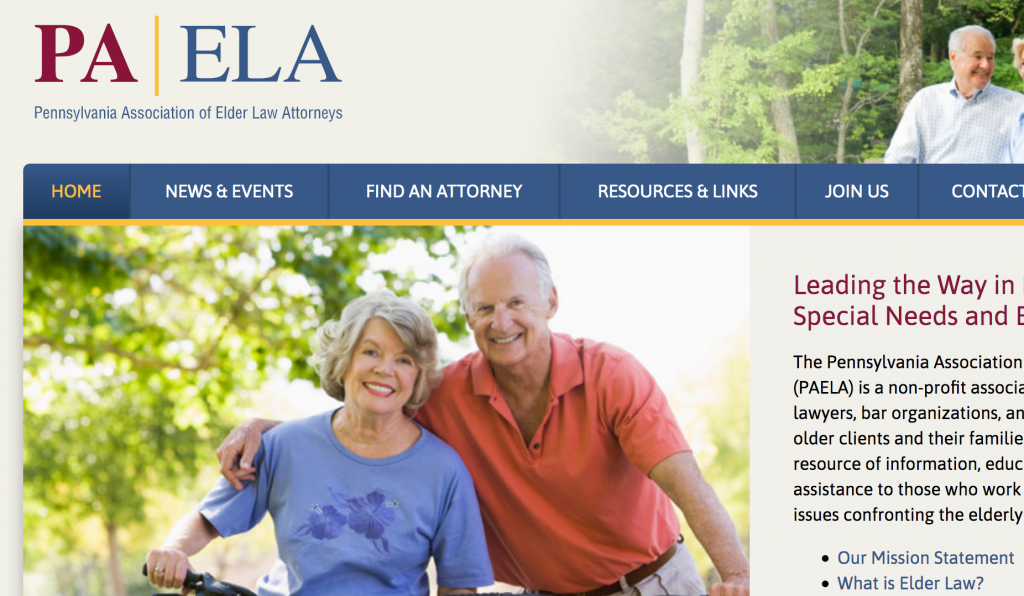Updating at the Pennsylvania Elder Law Attorneys’ Conference

Sometimes I think clients and the general public might believe attorneys continue on with their practice without feeling a need to refresh or keep up on current developments. This definitely is not the case with the group of elder law attorneys who are members of the Pennsylvania Association of Elder Law Attorneys (PAELA for short). PAELA consists of about 150 attorneys throughout Pennsylvania dedicated to elder law. It is the Pennsylvania Chapter of the National Academy of Elder Law Attorneys. To get an idea of the number of attorneys who are members and active in the group, according to the American Bar Association, as of the year 2013 Pennsylvania had 49,697 resident and active Pennsylvania attorneys. So the number of attorneys at about 150 belonging to and active in this group specifically dedicated to elder law is relatively small.
All of this comes to mind as I just returned from a three day PAELA annual conference in Bedford, Pennsylvania. If there is anything we failed to cover during those three days, I could not think of it off hand. Karyn Seace, Esq., another West Chester Certified Elder Law Attorney and myself, facilitated the first program of the conference which was scheduled to deal with any issues/questions elder law attorneys have where they would like input from other attorneys. This gave us the opportunity to compare, for instance, what is happening in Pittsburgh and the western end of the state and rural Pennsylvania with developments in the Philadelphia suburban and southeastern portion. That information is especially relevant at this time since Pennsylvania is rolling out a managed care health insurance program, Community Health Choices, which affects seniors and disabled persons on a different schedule in different portions of Pennsylvania.
Since many people do not even know what an elder law attorney does it could be helpful to describe it as combining regular and traditional estate planning with planning relating to chronic care needs. If you die without experiencing a chronic illness today it is unusual. Preserving assets through chronic illness is important as is health care and quality of life and quality of care concerns.
Elder Law involves preserving assets but also preserving health and life quality and dealing with family issues though the generations. Sometimes elder law attorneys act almost as family counselors when family members struggle with intergenerational and interfamily issues. Although “elder” is in the name, elder law attorneys also deal with families who have special needs children and adults and younger clients who merely want wills and trusts but look forward to planning for the future and want to know how that would look.
Elder law also becomes involved in financial plans and, in this regard, it is very helpful to consider what is the effect, for instance, of moving to an adult community. Retirement communities have agreements that actually are contracts. It helps to know what the agreement says and what the effect is on resources and on the future estate.
In addition to keeping up with changes in the law and in services available to our clients, we as PAELA members work to influence the laws to protect and benefit our clients. In today’s world that means working with a lobbyist who gives advance notice regarding potential new laws, budgets, and regulations that could impact our clients. PAELA also receives reports from a national lobbyist on recent and continuing developments.
PAELA came into existence several years back when it became obvious that it is not enough to have day to day information at our fingertips (although we have that also through our 24/7 listserv) but lawyers representing seniors need to know not only what the laws are but what the laws will be.
For instance, currently some states have applied to the federal government for “waivers” regarding who is entitled to receive benefits. Some of these waivers would limit services or make them unavailable for some applicants.
In reviewing Medicaid for nursing home coverage and for at-home services under a waiver program, individual state differences were discussed. The ongoing discussion regarding services at home continued.
Now it is time now to return to work (and catch up on some sleep as well).
About the Author Janet Colliton
Esquire, Colliton Law Associates, P.C. Janet Colliton has practiced law for over 38 years, 37 of them in Chester County, Pennsylvania, a suburb of Philadelphia. Her practice, Colliton Law Associates, PC, is limited to elder law, Medicaid, including advice, applications and appeals, and other benefits planning including Veterans benefits, life care and special needs planning, guardianships, retirement, and estate planning and administration.
